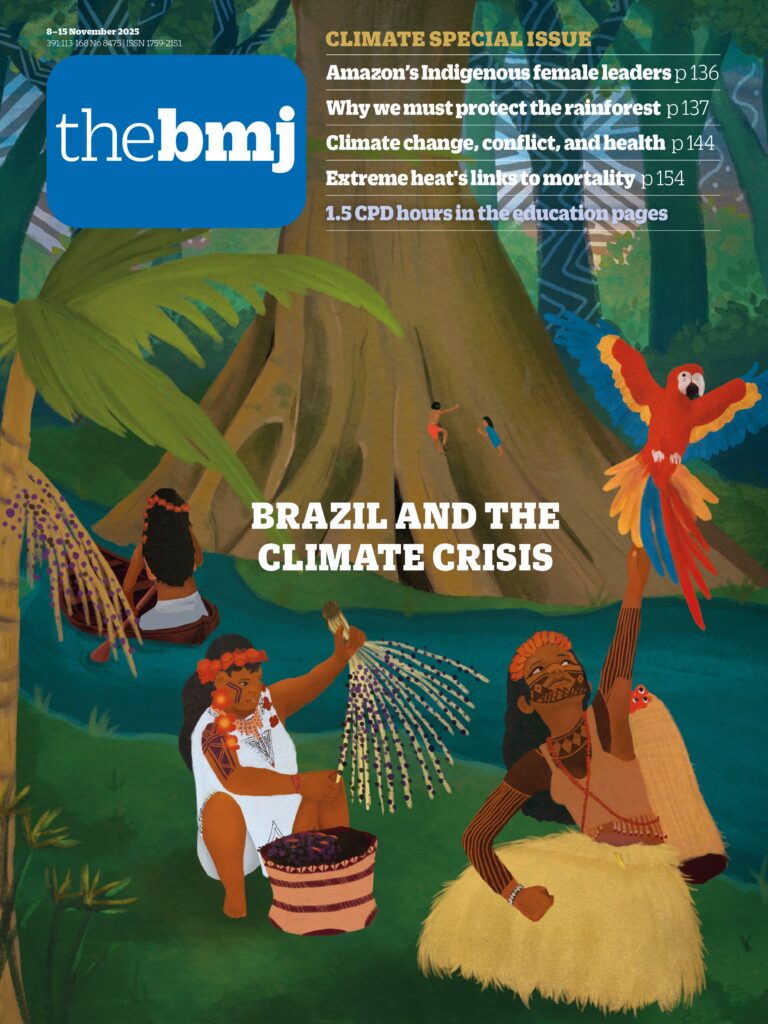The climate crisis—remember that? I appreciate that our attention is being distracted elsewhere, but our greatest existential threat, other than Donald Trump’s ego, is ever spiralling rapidly out of control. The climate crisis no longer seems to matter (doi:10.1136/bmj.r2309), because politicians and corporations don’t want it to.1
Has a newspaper, for example, ever devoted as much space to the climate crisis as to a discredited royal formerly known as prince? Will we ever care as much about the alarming statistics on global heating (doi:10.1136/bmj-2025-084675 doi:10.1136/bmj-2025-086218)23 as we do about Celebrity Traitors? Are we “faithfuls,” or are we traitors to the planet and humanity?
When Hugh Montgomery, new co-chair of the UK Health Alliance on Climate Change, asked the author of a Ministry of Defence climate report whether “the train was hurtling towards the cliff edge,” he was told that it had gone over some time ago—and the challenge we now face is how to stop all the carriages being dragged with it (doi:10.1136/bmj.r2226).4
The reality of the manmade destruction of our environment is playing out in real time, perhaps most damagingly in South America, which hosts this year’s COP conference (COP30) in Brazil’s Amazonian city of Belém. The Amazon is critical to the planet’s regulatory system. It’s a vibrant forest of vital biodiversity, with ancient riverine indigenous communities that coexist with the natural world in a way that modern living can’t replicate (doi:10.1136/bmj.r2100 doi:10.1136/bmj.r1796 doi:10.1136/bmj.r1925 doi:10.1136/bmj.r2010 doi:10.1136/bmj.r2139 doi:10.1136/bmj.r2186).5678910 Economics, agriculture, and greed are driving the destruction of indigenous lifestyles, native species, and the network of forests and rivers that sustains our planet. Our power hungry politicians and profit hungry corporations collude to deprioritise mitigations for the climate calamity, when those mitigations are more tangible than ever.
In this moment of absolute crisis we can mitigate, we can agitate, and we can use electoral power to begin rebalancing our world. Examples exist of legal routes to enforcing climate action (doi:10.1136/bmj.r1568)11; of evidence of the medical impact of weather events, although we need more research on health effects (doi:10.1136/bmj-2025-084906 doi:10.1136/bmj.r2208)1213; and of the potential benefits of climate friendly policies, such as new data we present on the relation between “greening” of environments and health benefits (doi:10.1136/bmj-2025-084618).14
The leaders who will gather in Belém have a range of options. These include ending fossil fuel extraction, re-engineering agriculture and food systems, taking measures to enforce corporate responsibility, finding sustainable methods of human habitation and transportation, and ending war and conflict (doi:10.1136/bmj.r1578).15 We know some of the policies that can work, but we lack the will, the investment, and the focus to do what, after all, is in the best of all our interests.
This duty falls not just on politicians—and, given the track record of betrayal at previous COPs, it’s understandable to be cynical about what this one will achieve. The duty is also in the hands of all of us, as we say in every climate themed issue of The BMJ (bmj.com/content/375/8309; bmj.com/content/379/8356; bmj.com/content/383/8401; bmj.com/content/387/8444). Within the constraints of personal finances we can choose how we heat our homes, how we travel, who we bank with, and what we eat (doi:10.1136/bmj.r2246).16
We can choose to raise our voices about the climate crisis with friends, colleagues, and patients. Or we can choose, as too many of us have always done, to think only of ourselves, of the here and now—and remain traitors to humanity and the planet. The path we must instead choose, and be faithful to, is to think first of the world we’re bequeathing to our children and future generations.

